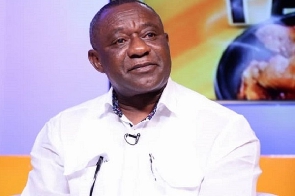Dr. Henry Kwabena Kokofu, Executive Director of the Environmental Protection Agency (EPA) has bemoaned the withdrawal personnel of authority from the team that inspects imported hazardous substances, a situation which makes the monitoring process incomplete.
“The Customs, Ghana Standard Authority, EPA, National Security, and others, should be here to do the checkup. Upon my visit today at Ghana Port and Harbour Authority (GPHA), I am informed that EPA is no longer part of the inspectorate team, which I strongly disagree with,” he noted.
Dr. Kokofu who is leading a team of EPA officials on a working visit to some industries in Tema and its environs made the observation at the Tema Bonded Terminal (TBT) at the Tema Port.
The EPA team’s working visit to institutions in Tema was to determine the extent of adherence to environmental safety protocols.
“So from here, I am going to notify the appropriate sectors that I am bringing back EPA personnel who have been trained on these hazardous substances, so that we help to forestall any environmental hazards like the release of these products to the market,” Dr. Kokofu said.
TBT is the facility where goods that are classified as hazardous are placed under specialized conditions and handled with high level expertise.
Products are sent to the TBT, where they are segregated and inspections are done on them to ascertain their potential hazards or otherwise should they be released into the public domain.
Importers of such products, therefore, would initially apply to EPA for permit to import these items; EPA would look at their warehouses, their suitability to handle such products, the purpose for which they are seeking the permit, and when EPA is satisfied, the schedule of the permit would then give the conditions which include; isolating the goods at the TBT.
Dr Kokofu said there had been several complains to EPA that some of these hazardous products found their way to areas they were not supposed to be, “Particularly, in crowded and residential areas, where lives and properties are exposed to these corrosive, explosive, dangerous products.
“So it is within our mandate to ensure that we regulate where they take some of these products to and how they use it on the field to avoid any environmental catastrophe”.
Dr. Kokofu asked all stakeholders, particularly importers, to adhere to the rules, and that citizens should feel free to report to EPA when they found people going against the rules so the Agency could take appropriate actions.
The EPA Executive Director observed that the staff at the terminal were not in the appropriate Personal Protective Equipment (PPEs) to handle dangerous substances.
“I was informed that Ghana Ports and Harbours Authority (GPHA) had contracted a company with the expertise to provide such PPE, and also gadgets to monitor and detect radioactive substances in the imported containers, we immediate action on delivery,” he said.
Dr. Kokofu said there were also containers that were under confiscation and the protection of the Customs Division of GRA; “We at EPA must do the monitoring to ensure that the disposal of such substances comes under our purview so it does not get into wrong hands by way of handling.
“It calls for collaboration between all the regulatory agencies so we would be able to tackle the problem head on”.
General News of Friday, 5 March 2021
Source: GNA













